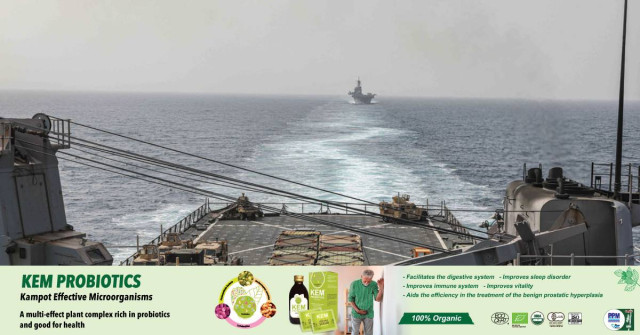UN Security Council Demands Houthi Rebels Stop Red Sea Attacks in Vote that Implicitly Condemns Iran

- By Associated Press (AP)
- January 11, 2024 10:50 AM
UNITED NATIONS — The U.N. Security Council demanded an immediate halt to attacks by Yemen’s Houthi rebels on ships in the Red Sea in a resolution adopted Wednesday that implicitly condemned their main weapons supplier -- Iran.
The resolution, sponsored by the United States and Japan, was approved by a vote of 11-0 with four abstentions – Russia, China, Algeria and Mozambique.
It condemns “in the strongest terms” at least two dozen attacks carried out by the Houthis on merchant and commercial vessels, which the resolution says are impeding global commerce and undermining navigational freedom.
The Iranian-backed Houthis, who have been engaged in a civil war with Yemen’s internationally recognized government since 2014, have said they launched the attacks with the aim of ending Israel’s devastating air-and-ground offensive in the Gaza Strip.
A U.S.-led coalition of nations has been patrolling the Red Sea to try to prevent the attacks. In the past day, the Houthis fired their largest-ever barrage of drones and missiles targeting shipping in the Red Sea, which the U.S. and British navies shot down in a major naval engagement.
Last week the U.S. and 12 other countries issued a statement calling for the immediate end of Houthi attacks and warning that further attacks would require collective action. “The Houthis will bear the responsibility of the consequences should they continue to threaten lives, the global economy, and free flow of commerce in the region’s critical waterways,” they said.
U.S. Ambassador Linda Thomas-Greenfield told the council Wednesday: “If the Houthi attacks continue, there will be consequences.”
She said the United States knows Iran is involved in planning Houthi attacks, and while it isn't seeking a confrontation with Tehran, “Iran also has a choice: to continue providing or withhold its support for the Houthis, without which the Houthis would struggle to effectively track and strike vessels through the Red Sea and Gulf of Aden.”
Immediately before the vote, the council overwhelmingly rejected three proposed Russian amendments. At least nine “yes” votes and no veto are needed in the 15-member Security Council for approval of an amendment or a resolution. Two of the proposed amendments got just four “yes” votes and one got five. The United States and United Kingdom both voted against all three amendments, but their vetoes didn't count because the amendments failed to get the minimum nine “yes” votes.
Russian Ambassador Vassily Nebenzia said Moscow condemned the attacks on civilian vessels but called the resolution “politicized,” saying Moscow believes the real aim of the coalition “cobbled together” by the U.S. and its allies ostensibly to ensure security is really to legitimize its actions and get an open-ended blessing from the Security Council for future activities.
The defeated amendments said the resolution would not set a precedent, and would have replaced a provision taking note “of the right of member states, in accordance with international law, to defend their vessels from attacks, including those that undermine navigational rights and freedoms.” A third amendment would have added language to reflect that “the escalation in the Gaza is a main root cause of the current situation in the Red Sea,” Nebenzia said.
Thomas-Greenfield accused Russia of proposing the amendments “in bad faith at the last minute,” telling the council they were “divorced from reality.”
“The Houthis are simply intoxicated with power,” she said, The proposed amendment “falsely” citing the conflict in Gaza as the cause of the rebel attacks would only further embolden the Houthis and establish “a dangerous precedent for the council to legitimize these violations of international law,” she said.
“The Houthis are targeting a range of vessels, few of which are owned or operated by Israelis,” Thomas-Greenfield said. “And so, what is at issue here is not any particular conflict, but rather the simple principle of upholding freedom of navigation and a waterway vital to the free flow of global commerce.”
The resolution also demands the immediate release of the first ship the Houthis attacked, the Galaxy Leader, a Japanese-operated cargo ship with links to an Israeli company that it seized on Nov. 19 along with its crew.
The Red Sea links the Mideast and Asia to Europe via the Suez Canal, and its narrow Bab el-Mandeb Strait. Nearly 10% of all oil trade and an estimated $1 trillion in goods pass through the strait annually. But the Houthi attacks have forced many shipping companies to bypass this route and use the much longer and more expensive route around the Cape of Good Hope in Africa.
The resolution affirms that “the exercise of navigational rights and freedoms by merchant and commercial vessels, in accordance with international law, must be respected.”
Thomas-Greenfield lashed out at Iran for supplying advanced weapons systems to the Houthis in violation of U.N. sanctions including drones, land attack cruise missiles, and ballistic missiles, which she said have all been used in attacks on vessels.
Without naming Iran, the resolution condemns all arms dealings with the rebels, which violate Security Council sanctions and calls for “additional practical cooperation to prevent the Houthis from acquiring the materiel necessary to carry out further attacks.”
Russia and others have warned that adoption of the resolution could impact a tentative cease-fire between the Houthis and a Saudi-led coalition fighting on behalf of Yemen’s exiled government that has held for months despite that country’s long war. And there is growing concern that any wider conflict in the sea — or a potential reprisal strike from Western forces — could reignite those tensions in the Arab world’s poorest nation.
The resolution recognizes the need to avoid escalating the situation. It “urges caution and restraint to avoid further escalation of the situation in the Red Sea and the broader region.” And it “encourages enhanced diplomatic efforts by all parties to that end, including continued support for dialogue and Yemen’s peace process under the U.N. auspices.”















